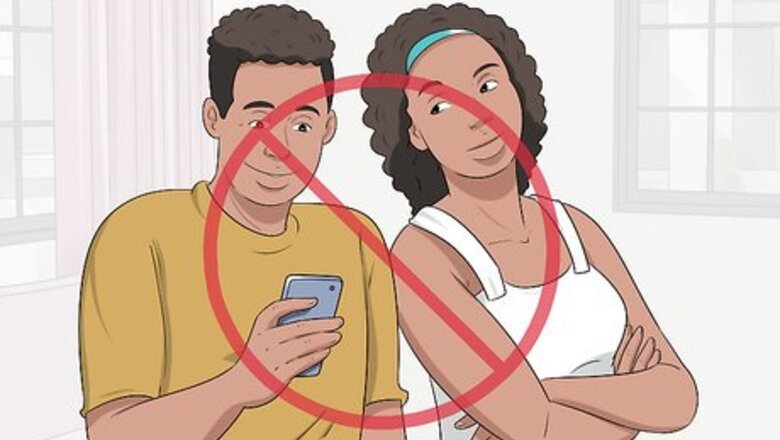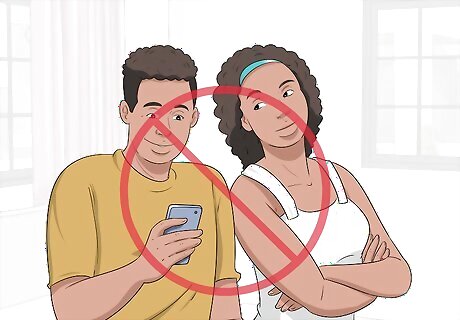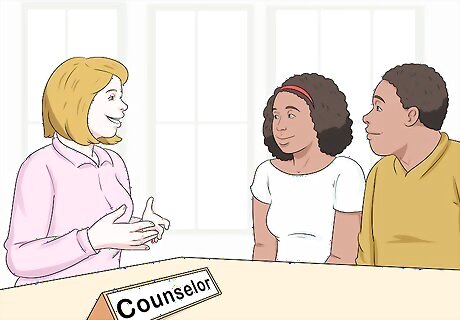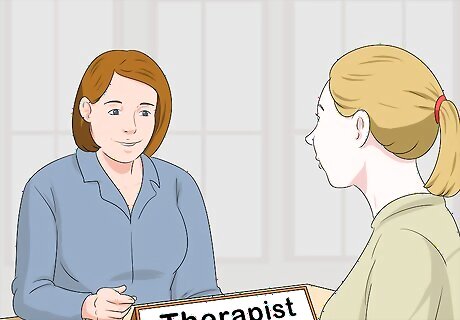
views
Improving Your Communication

Back away from monitoring their activities. It might be difficult to create space for your partner. If you’re used to going through your partner’s things or asking loads of questions when they go out, learn to cut back on these practices. While it can be scary, it shows that you’re willing to trust your partner and not over-involve yourself in their life. Practice giving trust before suspicion. Give your partner trust first and see how it feels. Let your partner know you are choosing to trust them instead of being suspicious. Remember that if you're monitoring your partner, it means that you're already suspicious of them. You might misinterpret anything that you find.

Talk openly with your partner. Clearly talking things over with your partner can help you overcome trust issues. Being able to clearly communicate without feeling like either of you are hiding something can increase communication and build trust. If there are situations that worry you, state your concerns and why they bother you. Let your partner respond and hear them out. For example, instead of worrying what your partner is doing when they go out, have a talk before they leave and get an idea for where they are going and what they are doing. Get in the habit of having these talks without pressing them for information. When talking to your partner, be calm and friendly. If you accuse or blame them of things, they may become defensive. If you appear mad or upset, they may not want to talk.

Keep from blaming each other. Blame only makes things worse when trust is shaky. If your partner feels mistrust in you or you trust your partner less, be cautious to not blame them. Instead, be receptive to what they say and hear them out. Ask questions instead of making accusations. There will be times when you think something is fishy. On such occasions, it's worth changing your approach and finding out more details. For example, if worried about your partner’s secretive texting, say, “I find it odd that you’re so secretive when you text. Can you tell me what’s up?” This works better than, “I don’t trust you and think you’re hiding something from me.”

See a couples’ counselor. Trust issues can ruin a relationship quickly. If you and your partner are committed to the relationship and want help navigating your trust issues, a couples’ counselor can help. The person can help you and your partner talk through your difficulties and find new ways to relate to one another. Your counselor will support you to make changes to the way you interact together and begin to rebuild your trust. Look for a counselor who works with couples specifically and who will see you and your partner together. You can find a couples’ therapist by calling your insurance provider or local mental health clinic.
Working Through Insecurities

Build your self-esteem. If you feel insecure in yourself, you may feel unworthy of your partner or scared they will find someone better than you. Recognize that these are your own insecurities and may have nothing to do with your partner. Raise your self-esteem by acknowledging your strengths, doing things that make you feel good about yourself, and replacing negative self-talk with positive self-talk. For example, if your inner dialog tends to tell you how awkward you are or how embarrassed you should be, replace it with things that make you feel good about yourself, such as, “Even if I didn’t explain myself well, I still tried and did a better job communicating.” If your self-esteem issues are interfering with your relationship, you may want to seek help from a licensed therapist on your own. They can help build your self-esteem, which may strengthen your relationship.

Explore your interests and hobbies. Develop yourself as an individual, not just as a partner in a relationship. Having interests and hobbies can also provide an outlet for stress. Find an activity that makes you feel good that you enjoy. Try to engage in your hobby at least once a week. If you don’t know where to start, try volunteering. You can meet new people and know you’re making a difference in your community. You can try and pick up a new sport, do yoga, paint, dance, hike, or create music.

Find support with friends and family. Talk about the jealousy or trust problems you experience and gain some perspective with a trusted friend or family member. If you need some help or advice, go to someone you trust to talk it out. Even if they cannot help you, they can still listen. Spend time with your friends and family outside of your relationship. Make time for meals, nights out, and activities with people you care about.

Manage your emotions in a healthy way. If you struggle to manage anxiety or jealousy in your relationship, learn to cope with these emotions without lashing out or hurting your partner. If you feel stressed, try taking some deep breaths before accusing your partner or feeling distrustful in them. This can help calm your body and your mind. If you struggle to process your emotions, try journaling, listening to music, or taking a walk.
Moving Past Your Own Hurt

Recognize your past hurt. Perhaps you were hurt in a past relationship or in your family, which now affects your ability to trust your current partner. While your experiences are valid, recognize that your partner is not the person who hurt you. If you struggle to trust due to past relationships, it’s worth acknowledging your experience and examining how it affects your current relationship. Your partner may even have hurt you or betrayed your trust in the past. If trust was broken in the past, forgive it and move on if you wish to continue the relationship. For example, if your last partner cheated on you, it makes sense that you would be extra careful this time around. Remember, however, that your current partner has not cheated on you. Clarify issues and find coping mechanisms. "I've had trouble trusting people for years. This article helped me really look at my problems and figure out where they're coming from. Now, I can start finding healthy ways to cope instead of just feeling stuck. I'm grateful to have a game plan to deal with my trust hangups and start making changes. The tips here gave me the clarity I desperately needed." - Richard K. Gain a new perspective on trust problems. "After being lied to and mistreated in the past, I struggle big time with trusting people now. Reading this opened my eyes to a new way of thinking. Even though it hurts, I'm starting to see I can slowly get over my issues if I work at it. Just knowing it's possible to move forward gives me hope. This guide helped me believe I won't always be plagued by distrust." - Simone M. Change future relationships. "I've had my trust shattered in past relationships. It's made it really hard for me to trust new people I date. The practical advice here showed me how I can overcome this. I need to change how I think about people and stop assuming the worst. Using these tips, I can stop my relationship anxiety from messing up my future. This article gave me the power to make big changes." - Brandon W. Save good relationships. "This guide made me realize my trust issues could ruin the healthy relationships I have now. The tips on reflecting and communicating better resonated with me. I want to fix my problems before my anxiety pushes everyone away. Now, I feel equipped to overcome my distrust and save the good connections in my life." - Heather M. Have a story our readers should hear? Share it with 1 billion+ annual wikiHow users. Tell us your story here.

Identity the current problems around trust. Take a moment and think about the specific problems you experience with trust. Pinpoint the behaviors or situations that make you feel uncomfortable. Ask yourself if your partner acts suspicious, has lied to you in the past, or has been unfaithful in any way. If your partner hasn’t been suspicious or unfaithful yet you still worry, recognize that your insecurity is what likely drives the distrust. If your partner has been unfaithful (or you’ve been unfaithful), ask yourself if you can let go and move on with the relationship.

Trust yourself. You might struggle to trust yourself if you’ve made bad decisions in the past with your relationships. Be willing to tolerate intense emotions and not do something reckless (like cheat) or take it out on your partner. Forgive yourself for your past mistakes and allow yourself to move on. Recognize that you’ve made mistakes or have been hurt in the past, yet you were able to learn from those experiences. Accept the lessons and move past the hurt by forgiving yourself.

Talk to a therapist on your own. Perhaps you were abused as a child or deeply hurt in a past relationship. If you’re struggling to work past previous issues that contribute to your ability to trust, consider seeing a therapist to help you. A therapist can help you work through your feelings and heal from your pain. You don’t have to do everything on your own. Find a therapist by calling your insurance provider or local mental health clinic. You can also get a recommendation from a physician or friend.

















Comments
0 comment